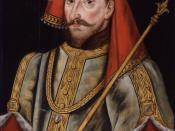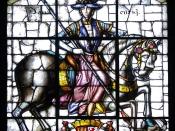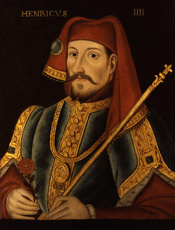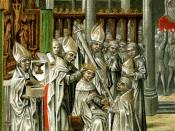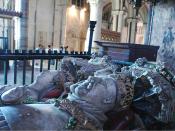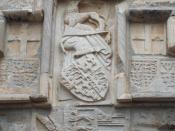Shakespeare's Henry IV, Part 1, opens in the royal palace in London, where King Henry IV of England is discussing the current state of his country with his councillors. In the three parts of his opening speech, King Henry IV discusses issues surrounding England's political strife and civil turmoil. Recognizing the explanation for the unrest as being his accession to the throne, Henry must face his opposition and attempt to reunite his troubled kingdom. Challenged with choices and decisions, King Henry reveals his intuitive solutions to resolve the instability. Closely emulating propaganda, this figurative passage uncovers King Henry IV's instinctive leadership qualities and his manipulative political strategy.
As the play opens, the legitimacy of King Henry's rein is in question. The first part of Henry's speech reveals that England has become plagued with rebellion, treachery, and shifting alliances in the period following the deposition of King Richard II. Addressing Westmoreland and his counsellors, King Henry brings into perspective his guilt towards the crown and his concerns for England.
The kingdom's recent instabilities have made him physically "shaken" and psychologically "wan" (l.1) and although he metaphorically reveals that he is exhausted like a horse in battle, Henry quickly shifts the tone of his speech to one full of strength and confidence.
Aware of the civil conflicts occurring throughout his country, Henry recommences his speech by recounting the hardships surrounding his countries civil war. It is here we begin to identify components of propaganda in Henry's dissemination of information. His highly suggestive use of dark, figurative language heavily emphasizes the severity of the war: "furious close of civil butchery" (l.13). Yet like a dynamic leader, King Henry speaks with passion and conviction, revealing his goals and presenting his intentions to salvage his country's future. He creates a carnal image personifying England's civil war as a mother drinking the blood of her children, but then vows to rid his country of this thirst. He continues elaborating on his country's sorrows with a stream of very physical images and very powerful words: "those opposed eyes ... like the meteors of a troubled heaven ... Did meet in the intestine shock" (ll. 9,10,12). The deliberateness of his statements emphasizes England's widespread discontent, but more importantly, reveals his own resentments towards the warfare. When comparing war to an "ill-sheathed knife" (l.17), which will no longer "cut his master "(l.18), King Henry makes clear to the audience that ensuring peace within his country is his overriding ambition.
Subsequent to his portrayal of civil war, the ruling King diverts the audiences attention towards his future objectives. In this second part of the monarch's speech, elements of propaganda again become very evident. King Henry's words become emotionally charged, refocusing his tone and direction towards patriotic solidarity, manipulative scapegoating and nationalistic goals. Henry believes the solution to his country's internal strife is to commence on a campaign into the Holy Land. Henry perceives a military crusade into Jerusalem as a means to create a sense of national unity amongst his countrymen. England will "March all one way" (l.15) and exhibit England's military strength: "We are impressed and engaged to fight, / Forthwith a power of English shall we levy; " (ll.21-22). Here, through the military terminology, the audience can take into account the Kings attempt to rally with patriotic diction. As well, Henry also creates a form of scapegoat with reference to "these pagans" (l.24). Although Henry does not bear blame on the pagans for any of England's internal struggles, he uses them as a political target, establishing a common public enemy to which both opposition and ally can detest. As a leader, King Henry understands the need for nationalistic goals. A Crusade would allow is men to fight "in mutual well-beseeming ranks" (l.14), and to reap the rewards accompanied by such a pilgrimage. Henry recognizes that England will be honoured with national glory and religious prestige if his armies fight to liberate the land where Jesus "walk'd those blessed feet" (l.25) and "were nail'd / For our advantage on the bitter cross" (ll.26-27).
As it seems, Henry should be praised for his desire to seize Jerusalem for the sake of Christianity. However, because the civil disobedience in England has derived from King Henry IV's illegitimate claim to the throne, the audience has to speculate the motives of Henry's true intention. Aware that his usurpation of Richard's crown has broken the 'divine right of kings,' King Henry hopes to cleanse his own guilt and divert the attention of his opposition away from himself. By promising to embark on a holy crusade, he attempts to sweep aside the moral issues of his rein and focus instead on blazing a path for future success. Therefore it cannot be overlooked that Henry's militaristic interest may derive from the Machiavellian strategy of effectively using power in order to establish and secure his own political power.
In the closing lines of Henry's first speech, the audience does not retrieve any new information about the King's intent. He states "our purpose in now twelve months old" (l.28), revealing his manipulative plan has been well thought out. Although almost perfectly suited to improve both his kingdom and his own power, King Henry's intentions will not commence anytime soon. Ironically, after asking his cousin Westmoreland about England's current situation, he learns that civil problems continue to hinder his manifested plan: "It seems then that the tidings of this broil / Brake off our business for the Holy Land" (ll.47-48). Instead of moving into the future, Henry has to deal with renewing issues from the past. With Wales and Scotland falling to civil uprisings, Henry is now forced to contend the threatening challenge of a rebel coup d'etat.
King Henry's first speech in Shakespeare's, Henry IV, Part 1, is a rich section of the play. As well as raising the audience's awareness of England's the current political crisis, this emotionally charged passage helps to establish King Henry's mindset during this period of internal strife. Although his succession to the throne is in question, Henry remains committed to his goals of stabilizing his country. The audience learns that Henry possesses an understanding of the conflicts and displays a true commitment to his Kingdom. As is a propagandist, Henry understands the effectiveness of patriotism, nationalism and a scapegoat. There is evidence to say his objectives and use of manipulation may have had ulterior "Machiavellian" motives. However, morality issues aside, King Henry IV's first speech reveals that he does possesses the characteristics worthy of an effective leader.
